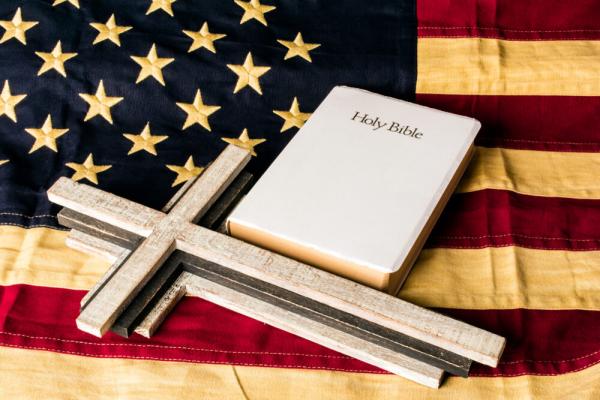Americans are more polarized than ever over the immigration issue. Recent polls show us neatly dividing up along gender, racial, and generational lines, but perhaps the most troubling split has opened up across religious ones. According to a 2018 Pew Research survey, only 25 percent of white evangelicals affirm that America has a responsibility to welcome refugees, far lower than any other religious group in the poll. By contrast, those who identify as religiously unaffiliated support welcoming refugees by a margin of more than two to one.
Scripture repeatedly teaches love for the other. The Hebrew prophets often wrote of caring for the poor, the orphan, the widow, and the immigrant. Leviticus 19:34 commands: “The foreigner residing among you must be treated as your native-born. Love them as yourself, for you were foreigners in Egypt.” And Jesus echoed these texts, citing hospitality towards the stranger as a definitive mark of his followers (Matthew 25:35). In this light, the results of the Pew survey point to a deeply troubling crisis in the evangelical community. Increasingly, evangelicals are conforming their views to party politics rather than allowing them to be transformed by Holy Scripture.
Immigration is far from the only issue demonstrating this alarming trend. According to a 2016 PRRI/Brookings poll, 72 percent of white evangelical Protestants affirmed that elected officials could be trusted to behave ethically even if they have committed transgressions in their personal lives. When compared with a similar survey in 2011, it shows an unthinkable 42-point jump from the 30 percent who answered similarly just five years earlier.
How could such a seismic shift in opinion be accounted for apart from political expediency? Considering the well-documented moral flaws of Donald Trump, there seems to be no other alternative. How could the evangelical community have been so easily swayed – one might even use the word duped? Why didn’t more of the faithful rise up behind prominent leaders like Albert Mohler who said, “If I were to support … Donald Trump for president, I would actually have to go back and apologize to former president Bill Clinton.”
How can someone who claims to stand on family values possibly support a policy of family separation that, in many cases, leaves no possibility for future reunification? How can someone who claims to follow a man who taught us to love our enemies possibly support an administration that refuses to provide children with basic necessities like soap, toothbrushes, or even a decent night’s sleep? It doesn’t add up, and it’s time Christians stood up and took notice because the religiously unaffiliated already have.
Conservative evangelical Christianity has long feared attacks from the outside. Atheists, members of the LGBTQ community, and liberals are commonly cited sources for the decline of Christian influence in America. Donald Trump understands this fear and has learned to use it for his benefit. Relax the Johnson Amendment here, organize a high-profile prayer gathering with prominent evangelical leaders there, until he is seen as a stalwart defender of the faith. Prominent evangelical leaders like Robert Jeffress, in turn, take to cable news, trumpeting him as, "the most pro-religious liberty … president in US history.”
But what if these aren’t the real enemies of the faith? What if the Johnson Amendment protects churches rather than limits them? What if equal access for marginalized groups doesn’t diminish the voices of evangelicals? And even if it does, what’s the worst that can happen? Perhaps, in the worst-case scenario, evangelicals might wake up one morning to find themselves culturally irrelevant. This bizarre marriage of religion and politics on the right, however, is much more sinister because it threatens the very heart of Christianity from within. If the current trends continue, evangelicals may gain political influence but are in serious danger of waking up one morning to find themselves unrecognizable as Christians.
Compare today’s evangelicals with the socially conscious evangelical Christianity of the 19th and early 20th century. These Christians instituted public education, fought for racial justice, women’s suffrage, humane working conditions, and a living wage. And now, these historically Christian positions are being taken up by the religiously unaffiliated. I rejoice with the Apostle Paul that, in some way, the message of Christ is still being preached, but I weep that people of faith are not joining hands with them to preach it.
If evangelical Christianity is to survive the next decade, it must extricate itself from its obsession with political influence. We must recover our history of social responsibility and remind ourselves of Jesus’ vision for humanity as articulated in the Sermon on the Mount and in Matthew 25. How can we work together to build a world in which caring for the marginalized are definitive markers of what it means to be human?
This vision for humanity is incongruent with 68 percent of evangelical Christians sensing no obligation towards refugees who are fleeing violence and crushing poverty. The two don’t fit together, and no amount of political wiggling or rationalizing will ever make them fit. Instead, we must be on the frontlines of articulating and advocating for a life-affirming future in which no one is excluded and everyone is welcomed with open arms.
Got something to say about what you're reading? We value your feedback!





